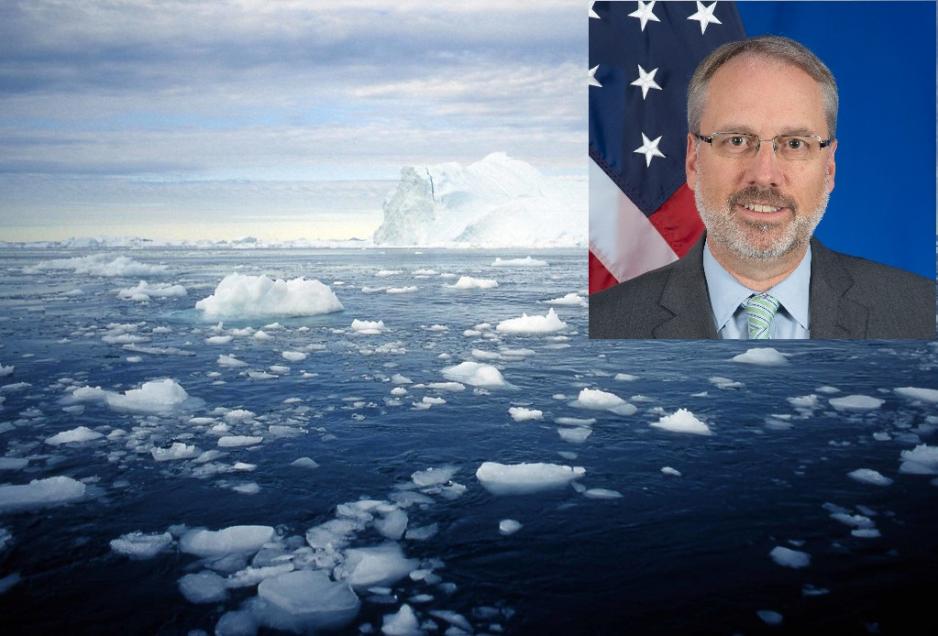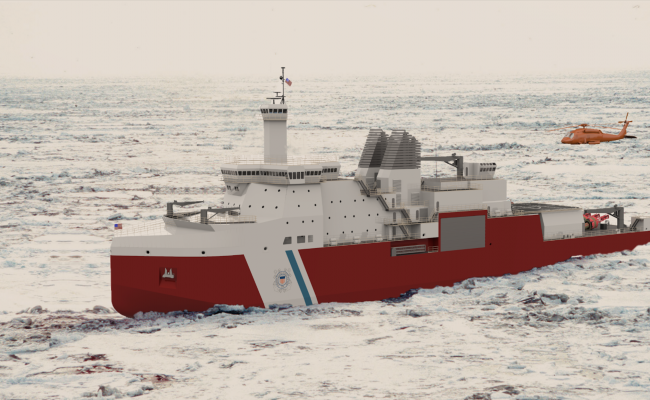– The U.S. is launching a comprehensive diplomatic approach in the Arctic region, says top-level official

James P. DeHart, career diplomat for 28 years, was appointed U.S. Coordinator for the Arctic region on July 29, 2020. (Photo Peter Prokosch / GRID Arendal, Photo of James Dehart by U.S. Department of State).
The U.S. Department of State has appointed James DeHart as U.S. Coordinator for the Arctic region. DeHart will lead the Department’s Arctic-related efforts, stepping into a position left vacant since 2017.
"In a few years, people will look back at this summer and see it as an important pivot point, a turning point, with a more sustained and enduring attention by the United States to the Arctic region."
Newly-appointed U.S. Coordinator for the Arctic region James P. DeHart made the prediction during a telephonic press briefing recently.
Career diplomat DeHart expressed that the U.S. is determined to work with partners throughout the region, including the governments in the Arctic, local and indigenous communities, and the state of Alaska.
Our objectives for the region are that it be peaceful and an area of low tension, and that there be close cooperation among the nations of the Arctic.
"We want to see economic growth and development and in a way that is supportive of local communities, including the indigenous communities of the region, and in a way that is environmentally sustainable, that respects principles of good governance and transparency", he added.
DeHart is the first U.S. top-level Arctic official in almost four years. U.S. Coast Guard Admiral Robert Papp held the position as U.S. Special Representative for the Arctic region from 2014 to 2017.
The reorganization of the State Department in 2017 and the subsequent removal of the position of the U.S. Special Representative for the Arctic Region signaled a lack of interest by the Trump administration to the Arctic region. In his opening remarks, DeHart assured that the U.S. aims for sustained efforts in the Arctic region.
Renewed interest
The Trump Administration’s establishment of the Office of the U.S. Coordinator for the Arctic region follows a number of pushes towards the Arctic lately.
"If you look at what is happening in our system over the last couple of months, you will see that we are launching a comprehensive and an integrated diplomatic approach and engagement in the Arctic region", DeHart said.
Amongst other developments, he pointed to Secretary of State Mike Pompeo’s visit to Denmark two weeks ago.
"I think very significantly they had a quadrilateral meeting there which included the ministers of Greenland and the Faroe Islands reflective of our increased engagement with Greenland and the Faroe Islands."
He also mentioned the opening of the U.S. consulate in Nuuk, which was reopened this summer after 67 years.
We have the opening of our consulate in Nuuk, Greenland, which is really significant when you look at finite resources that we have for our diplomatic platforms around the world.
The opening came just two months after the U.S. announced a $12.1 million aid package for Greenland to be used on energy and resource development, education capacity building, and rural sustainable development.
The U.S. has also stepped up its military presence in the European High North recently. In May, U.S. surface vessels operated in the Barents Sea for the first time since the 1980s in an exercise with the British navy.
This summer the U.S. Air Force issued an Arctic strategy. This is the first time that the Department of the Air Force issues a strategy for the Arctic region.
DeHart also pointed to the memorandum issued by the White House in June for the development of an icebreaker fleet by 2029. In his opening remarks he expressed that the U.S. want to make sure that they have the capability to operate in the American Arctic as the current fleet is aging.
"We want to have a fleet that’s available for security missions; to support search-and-rescue; to support, as appropriate, economic activities; and science and research as well."
Also read
A changed geopolitical environment
Besides linking the U.S. approach in the Arctic to environmental and physical changes and increased accessibility, DeHart points to the geopolitical developments in the region as its relates to China's commercial focus and Russian military developments.
"We want this to be a region of peaceful cooperation in the realm of science and search-and-rescue and education, but we recognize also that the Arctic is NATO’s northern flank, and so we look at the region through that lens as well."
We recognize also that the Arctic is NATO’s northern flank, and so we look at the region through that lens as well.
"When you look at the way China has approach investment and commercial activities I think we have to be very cautious and guarded in terms of what this could mean for the very high standards of governance that we all want to see in the Arctic region."
On the question from Wall Street Journal whether the US sees a danger in increasing cooperation between China and Russia in the region, DeHart answered his early impression is that the cooperation takes place at more of a tactical level than strategic.
"I’m not sure that Russia necessarily wants to embrace a comprehensive Chinese role in the Arctic. So I see some differences, I guess, in their respective interests that could pose some constraints on their cooperation in the long term."
DeHart, a foreign service officer for 28 years with significant experience in regional security and international negotiations, recently served as Senior Advisor for the Office of Security Negotiations and Agreements in the US State Department. From 2015–2018, DeHart served as Deputy Chief of Mission in Oslo, Norway
The career diplomat will lead the State Department’s Arctic strategy and diplomatic engagement on Arctic-related issues, reporting directly to Secretary of State Mike Pompeo and the Deputy Secretary on all Arctic matters.


